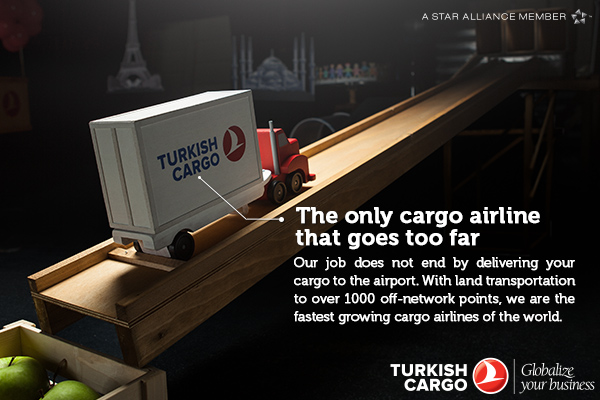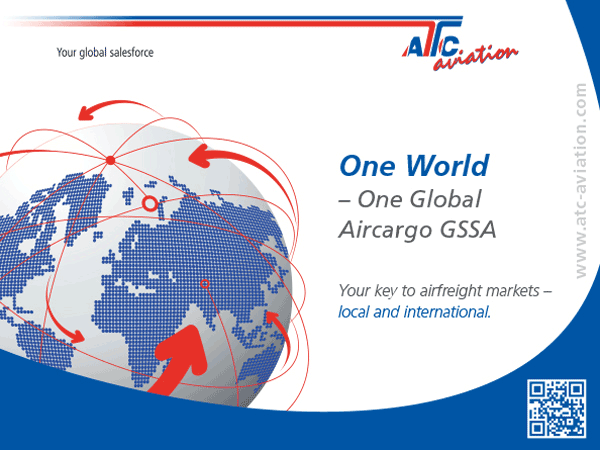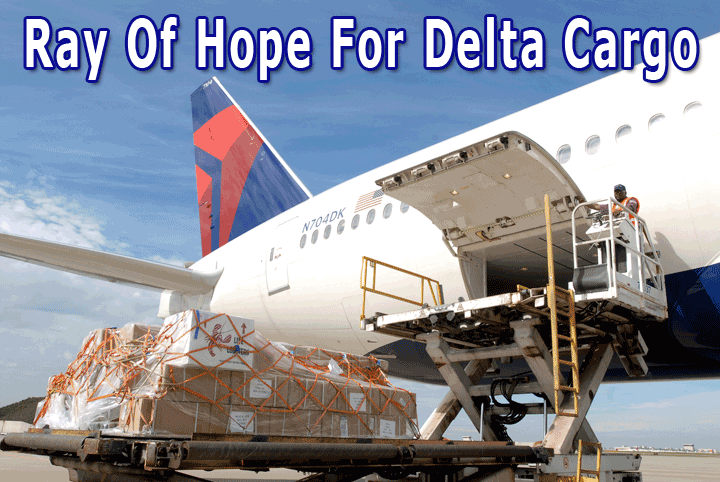
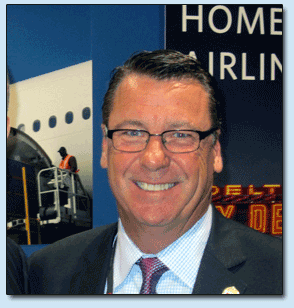 Having
piloted the big carrier’s cargo fortune into a positive air space
in 2014, Delta Cargo VP Cargo Commercial Ray Curtis is in Atlanta looking
forward to 2015. Having
piloted the big carrier’s cargo fortune into a positive air space
in 2014, Delta Cargo VP Cargo Commercial Ray Curtis is in Atlanta looking
forward to 2015.
Delta Cargo is seeing an increase in business
and revenue, finishing 2014 on a positive note, and quite strongly.
Tipping his hat—with an eye on available
lift—Ray quickly adds:
“On the passenger side, we’re
performing very, very well—we’re seeing record revenues as
well as record operational performance, which is also good for our cargo
customers.”
With a new reporting structure announced
earlier this year, the commercial side of the business now reports directly
to Steve Sear, s.v.p. - Global Sales, with operations reporting directly
to Bill Lentsch, s.v.p. - Airport Customer Service and Cargo.
Ray reports he is in the swim, and the water
is “just fine.”
“We’re already seeing the benefits
of this restructure; Bill and Steve are fully engaged, spending time in
our areas, and showing great interest in cargo.
“They’ve also attended and participated
in customer events and had the opportunity to interact with our customers.
“The restructure allows us to benefit
more directly from resources on the commercial and airport operations
side of Delta’s business and also provides greater opportunities
with technology, leveraging what has worked on the passenger side.”
The Paper
Chase
“Delta Cargo is out front and experiencing
positive results in our effort to remove paper from the business.
“In fact, it needs to be pointed out
that Delta Cargo is leading the industry with international eAWB penetration
of 34 percent compared to about 20 percent for the industry.
“Sure, there is more to do, but we
are doing it and expect the pace of increased penetration of eAWB to gather
even greater momentum in 2015.
“Domestically, Delta Cargo also achieved
positive results by reaching eAWB penetration of 73 percent,” Ray
Curtis declared.
Always Ray
Ray Curtis has been in the air cargo business
as long as we can remember— and we go all the way back to 1975,
reporting monthly as Air Cargo News nearly 40 years ago.
Along the way we have met thousands of people
in air cargo, but Ray always impressed us as he has gained a reputation
for being “hands on.”
There is an easygoing, relaxed “Mohair
Sam” attitude about Ray Curtis that brings a sense of purpose and
caring into what can sometimes be an impersonal, international shipping
business.
No amount of sloganeering or promises can
replace the quality of what Curtis brings to the table.
He believes in himself and his team and
is always ready when others might feel it is time to duck the tough questions.
“The sales team and I partner closely
with our customers,” Ray said.
“We work together with our colleagues
to deliver the products and services that provide value to them.
“And it’s the people of the
airline who make the difference.
“It’s because of their intentionality
and commitment that we’re able to move as much as we do as fast
as we do without compromising the personal aspect of the business.”
The
Delta Difference
  “It’s part of the Delta culture
to strive to provide a great customer experience—we call it the
Delta Difference.
“It’s part of the Delta culture
to strive to provide a great customer experience—we call it the
Delta Difference.
“Delta realizes from the get-go that
superior customer service and relationships can determine who gets the
business when everything else is equal.
“And when the company does well, it
comes back around to the people in the form of profit sharing.
“Recently, employees received an advance payout of our profit sharing,
which was well-deserved.”
Push DL
Profit (and forecasting) sharing aside,
we wonder whether, despite rapid growth, has DL been been able to maintain
service delivery and customer contact levels.
“Although we’re constantly searching
for ways to grow the business, we can also count on our people to provide
a great experience for our customers so they want to return to us.
“Delta Cargo hosts several customer
events a year to hear directly from our customers on what we’re
doing well and what we can improve.
“We listen to them and make changes
wherever we can to be a better business partner to them.
“For example, we know our customers
appreciate proactive communication when it comes to the status of their
shipments.
“So this year, we’ve made changes
to our business to be more proactive in communicating with our customers.
“We’ve made several enhancements
to products recently, including:
∑ A
dedicated team of Equation handlers in Atlanta whose entire focus is on
moving Equation shipments to and from this hub. This team exclusively
handles our international express products from acceptance to loading.
∑ Our
Pharma network has increased 27 percent this year; we now have 47 stations
globally. We have also introduced a new offering of +15°C to +25°C
temperature control (also known as room temperature control).
∑ This
year we launched our Variation Fashion, which specializes in the transportation
of high-end garments using specialized containers.
“We’re making investments in
technology that make doing business with Delta Cargo easier, including
simplifying the acceptance of shipments through technology enhancements.
“Also in 2014, Delta introduced a
new credit card functionality allowing cards taken at booking to be used
as a placeholder for charges to be calculated and applied at shipment
acceptance or delivery.
“Finally, tracking performance down
to the station level and reviewed on a daily basis has put transparency
at a critical level.
“It’s no secret that instant
information up and down the line gains critical importance as now we are
sharing cargo goals among Operations and ACS as part of that aforementioned
realignment.
“We believe we have to measure results
to get better.”
Looking At
2015
“In 2015, we look forward to strengthening
our position in the market even more. Recently a report projected air
cargo traffic to grow at an annual rate of 4.7 percent over the next 20
years, with global air freight traffic expected to more than double by
2033.
“That is positive news for us and
the industry as a whole.
“We’ve seen continued improvement
in business with the increase of mainline aircraft coming into our fleet.
“The B717s, which are replacing many
of our regional jets, are much more cargo-friendly. Delta has also added
the 737-900s to replace some 757s, which allows for greater amounts of
cargo capacity.
“Our nonstop widebody service on transcontinental
flights has given us a competitive advantage in many regions, allowing
us to better grow our market share. Currently there is more demand from
the U.S. to Asia.
“We recently replaced our 747 aircraft
with 777s on flights to Tokyo out of ATL, JFK, and SEA, and we’re
seeing solid results. We’re encouraged by Q4 activities from the
U.S to EMEIA as well.
“Delta Cargo domestic business is
strong.
“In June, the Port Authority of New
York and New Jersey reported that Delta was the top carrier amongst all
airlines in terms of customers enplaned and freight shipped at JFK, which
was the first time in recent history that a single carrier finished number
one in both measures.
“We expect the recent positive trending
we’ve seen to continue.
“In 2015, we look forward to strengthening
our position in the market even more.
“Delta has a strong corporate commitment
to Cargo.
“And with the new alignment, we’ll
have the ability to apply some best practices that have proven to be successful
on the passenger side to cargo moving forward.”
It’s
About People
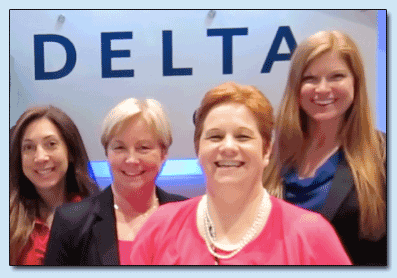 Ray gets back to one of his favorite themes.
Ray gets back to one of his favorite themes.
“Delta operates the best airline in
the industry, and now that we’re more closely aligned to the passenger
side, we’ll be able to tap into some of those resources.
“Delta has taken a different path.
“Our people are the best in the industry,
and they truly are what sets our airline apart.
“Our team attends as many industry
events as possible during the year.
“At the TIACA ACF in Seoul, Delta
Cargo sponsored a workshop on Forward Notice of Advance Data and our Manager
of Cargo Security, Derek Duiser, was on the panel.
 “It’s
important that we continue to have open and collaborative dialogue with
all players on the regulatory side. “It’s
important that we continue to have open and collaborative dialogue with
all players on the regulatory side.
“An ideal world would be a common
set of regulations and standards around the globe. Providing key information
to the regulators early in the shipment life cycle, which can be used
for a risk-based assessment, is definitely a goal that our industry should
strive to meet.
“The industry’s drive for eFreight
needs to remain a focus – we are seeing good progress at Delta and
are pleased with the progress I noted earlier.
“However, there is still a long way
to go—removing paper from our business improves data integrity and
makes our industry more efficient overall.”
Back to Basics
“We’re always looking for ways
to provide our employees relevant training to make them better at what
they do.
“As far as recruiting, there’s
definitely a need to seek ways to attract talent to the air cargo industry.
“The air cargo industry needs to develop
programs—whether they are co-op programs, more social media engagement,
or something different—that promote this great industry. Cargo is
often a hidden profession, and there’s no real path that leads to
it.
“The industry should be more innovative
in promoting what we do so others can learn about the ins and outs of
the industry.
“Our industry is exciting, and it’s
evolving so much—so yes, we need to get our story out there.
“The spirit of the industry is high—I
think people are optimistic as a whole.
“Although it’s very competitive
out there, there’s tremendous opportunity to gain business.
“Looking ahead, air cargo must embrace
technology to modernize cargo and the way we do business.
“We need to keep up with other industries
that are moving forward.”
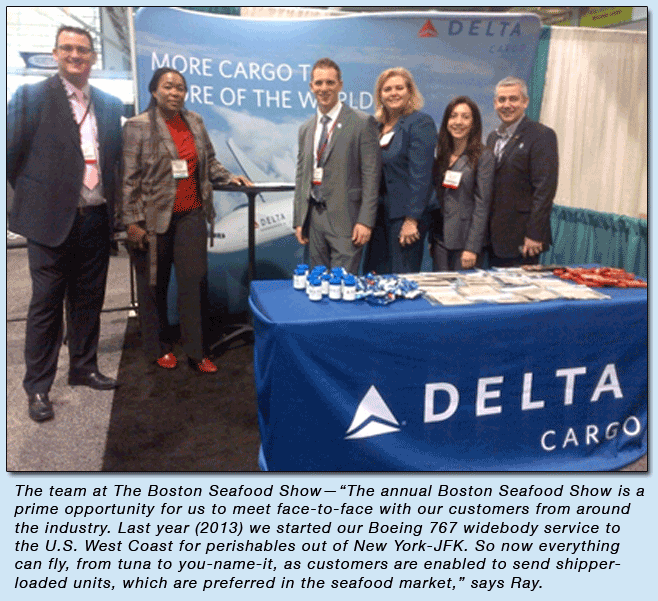 |
The Other
Americas
“We’re working very closely
with our customers in Latin America,” Ray said, “focusing
heavily on our fruits, vegetables, fish, and other fresh perishables.
“Delta moves large amounts of cargo
in that region via our widebody aircraft.
“Our flights are full, and we’re
very encouraged by the volumes.
“In Canada, we have great opportunity
to handle increase consignments of cargo now that we’ve upgraded
aircraft.
“The ‘plus’ is that we
have trucking opportunities to move cargo via our DTW, JFK, and SEA hubs.
“Although it is very competitive and
lots of airlines are flying into Canada, we’re very encouraged with
our progress.”
The Year That Was & Will Be
As 2014—the year that was—draws
to a close, we wonder what this industry leader and icon would do if he
could turn back the clock and begin his business career all over again.
Given a blank page, would Ray Curtis choose
air cargo?
“Yes. I would absolutely do it again.
“My 35-plus years in the air cargo
business have given me access and opportunity to be part of contributing
to the significant advancement of the industry, and I look forward to
doing my part both individually and as part of a great team to accomplish
even more. I’ve enjoyed working alongside and leading some pretty
outstanding professionals.
“And on the personal side, through
the years I’ve established relationships with so many colleagues
around the world that I hold dearly.”
Geoffrey
|
